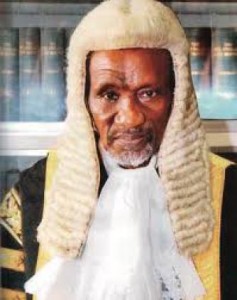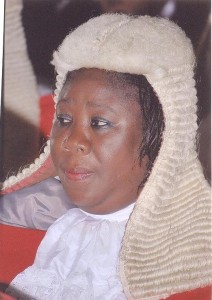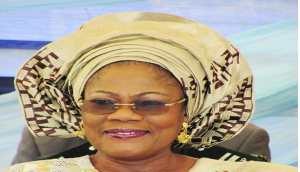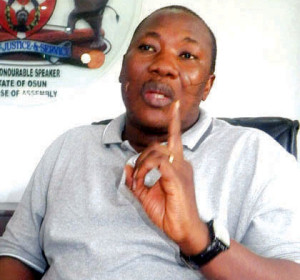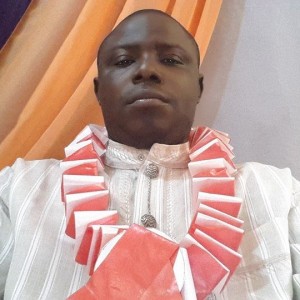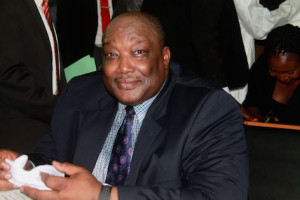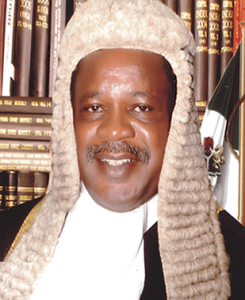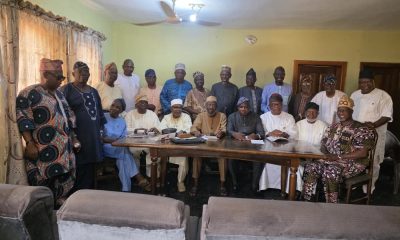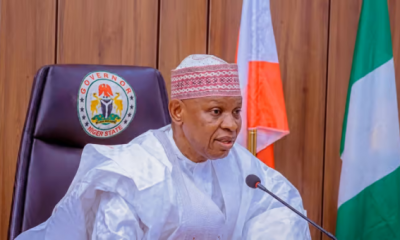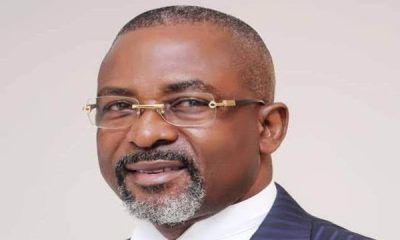News
Justice Oloyede Folahanmi: The Beginning of the End of a Judge

The standing tall tree of Nigeria Judiciary wobbled on June 24, 2015 with an outlandish petition sent to the House of Assembly, State of Osun, by a serving judge, Justice Oloyede Olamide Folaranmi, who presided over cases at Ikire High Court. Justice Folahanmi was not known until she put up a petition calling for the impeachment of Governor Rauf Aregbesola and his deputy, Mrs Titi-Laoye Tomori for bad governance and misappropriation of the state resources, among other allegations. Justice Folahanmi, in her petition dated June 23, 2015, said, among other things, that Aregbesola and Tomori deserved to be impeached for non-payment of salaries, pensions, “mind-bugling loans”, and financial indiscipline. She tongue-lashed the House of Assembly, civil society groups and journalists in the state for keeping silent on what she described as the “unfortunate situation” of the State of Osun under the Aregbesola’s administration.
The media; social and conventional, became drenched with the news of the Folahanmi’s petition, and opinions were divided on the eligibility; competence, morality and legality of the petitioner to put her arguably plucky pen to author the controversial petition. She was celebrated by the opposition party and became known across the world. The Aregbesola administration’s antagonist supported Folahanmi’s course. The PDP became the major plank of her struggle. Encomiums were poured on her by a very minute people of the society. She was called so many titles and beautiful names of past brave women traditional and social activists. Her news dominated the media space for months.
Some ascribed the title of the most popular and brave Iyalode of Ibadan, Chief Efunsetan Aniwura to Folahanmi. Yes; she was courageous, blunt and daring, but Aniwura was callous; cruel and notorious, according to history. She was a murderer who killed her servants at will for any wrongdoing. She formed her own kingdom and became rude to the Aare Latosa. Her insubordination was damning. When she was confronted by the Aare Latosa, Efunsetan Aniwura committed murder eventually. That is not a good end and nobody (a right-thinking) would want to associate with her.
But as she was celebrated, so was she (from sizeable number of people) chided for the petition. Legal practitioners, among which are Femi Falana; Professor Itsey Saga, Cheif Emeka Ngige (all SANs) condemned Folahanmi’s action, calling it a sacrilege and a sign of decadence in the Nigerian judiciary. The APC in Osun said Folahanmi’s petition was politically motivated and that the judge had embarrassed the judiciary with her petition. The Alliance of Collaborating Political Parties (ACPP) said it was unbecoming of a sitting judge to write a petition, saying that the judge had compromised and brought the judiciary to the cleaner.
The Osun Civil Societies Coalition (OCSC) said it could not silent and watched the judiciary dabbling into political arena with the Justice Folahanmi’s action. The OCSC wrote a petition dated June 28, 2015 and forwarded it to the National Judicial Council (NJC), calling for the investigation of the judge. The OCSC led by Comrade Waheed Lawal said: “It behoves on us to say that the words and language in the petition are unbecoming, maladroit and ungainly for the high standard of conduct expected of any judicial officer in this country. The magnitude of impropriety, of the form, dimension and concealed message of the petition violates every ethical standard devoted to the status of a judicial officer. If appropriate action was not meted on her (Justice Folahanmi) a floodgate will be opened and every willing and available Judicial Officer would soon become an instrument of use for the purpose of partisan politics.”
In spite of the knocks and kudos, Folahanmi’s petition received the attention of members of the House of Assembly. A seven-man committee was set up to treat her petition and investigate the allegations raised against Aregesola in it. The committee was headed by the Deputy Speaker, Honourable Akintunde Adegboye. The Committed sent a letter to the Chief Judge of the State, Justice Adepele Ojo to confirm whether Folahanmi was actually a serving judge or not. The CJ issued a query to Folahanmi to confirm the authorship of the letter and the latter confirmed that she wrote the petition. The committee invited her on Tuesday, July 28, 2015 to provide additional information to her petition, since she failed to attach documentary evidence to it. The judge refused to appear before the panel but was represented by her lawyer, Mr Lanre Ogunlesi (SAN). Ogunlesi told the committee that the appearance of Folahanmi would be predicated on having the copy of the response of Governor Aregbesola to her petition. Ogunlesi did not submit any evidence to support Folahanmi’s petition to the committee.
Responding to the petition, Aregbesola said it was frivolous, baseless and political. Aregbesola said: There was no basis for the petition. It is all lies. She is a judge that does not know herself as judge. You can only see a judge and they are not to be heard. She does not have any substance in the petition. She lied against me.”
However, the House Committee completed its tasked and observed that: “(i) The petitioner, being a serving judge in the state judiciary has acted contrary to the provisions of the Judicial Code of Conduct because she was not qualify in the first instance to forward such petition; (ii) that the petitioner did not follow due process in the presentation of her petition. The mode of presentation was contrary to the provisions of Order 26 of the State of Osun House of Assembly Standing orders and Rules. The petition was not presented by a honourable member and every page of the petition was not signed as required by the House Rules; (iii) that, contrary to the provisions of Order 26 (5) (a) of the House Standing orders and Rules, the petition of Justice Oloyede written with vitriolic, caustic and offensive language; (iv) that the petition submitted by Justice Oloyede was an embodiment of emotions and political partisanship.”
The committee recommended that Folahanmi’s petition should be dismissed because the she abandoned her claims by refusing to appear personally before the ad-hoc committee to substantiate the various allegations levelled against the Governor and the Deputy, and that her lawyer could not produce any documents to substantiate the allegations during their appearance.
According to the committee’s report, Folahanmi’s petition was against all known legal norms and ethics for a sitting judge to publicly take a political position, saying that her action was unprecedented.
The committee also recommended Folahanmi for disciplinary action by the state Judicial Service Commission, maintaining that her action was unethical and unbecoming of a serving judge in the state judiciary.
When the report of the committed was submitted to the House on August 5, 2015, the lawmakers deliberated on it with keen interest. The late Minority Leader of the House, Honourable Makinde Oladejo admitted that Folahanmi was not qualified to forward such petition. Oladejo, however, observed that the committee did not proffer solutions to some of the issues raised by the petitioner. After much argument, a motion was moved by the Majority of the House, Honourable Timothy Owoeye for the adoption of the committee’s report. The motion was seconded by Honourable Abdullahi Gbadebo.
The House of Assembly thereafter resolved: “That having critically examined, reviewed and investigated the various allegations levelled against the Governor and the Deputy Governor of the State of Osun in the petition submitted by Justice Oloyede Olamide Folahanmi, the State of Osun House of Assembly hereby resolves that the petition should be dismissed and that the State Judicial Service Commission should institute necessary disciplinary action against Justice Oloyede Olamide Folahanmi, having observed that her attitude is unethical and unbecoming of a service judge.
The Speaker of the House, Honourable Najeem Salam directed the Clerk of the House to forward copies of the Committee’s report, the House Resolution and other supporting documents to the State Chief Judge, the State Judicial Service Commission, the National Judicial Council, the Economic and Financial Crime Commission (EFCC) and other relevant agencies.
Folahanmi challenged the resolution of the House in court, praying that it should be quashed by the court. The case was dismissed by Justice Justice Moshood Adeigbe of Iwo High Court on Friday, April 29, 2016 for lack of jurisdiction.
On December 7, 2015, sent a letter to the Osun Civil Societies Coalition, intimating the group that the NJC had set up a three-man panel to investigates its petition against “Honourable Justice Olamide, Oloyede Folahanmi. The panel comprised the Chief Judge of Cross Rivers State, Justice Ikpi Itam, a Federal High Court Judge, Justice Ibrahim Auta (Chairman), and Mrs Inga (member of the council). The petitioners were invited to come appear the panel on January 12 and 13, 2016. Chairman of the OCSC, Waheed Lawal led other members of the group to the panel. An Abuja based lawyer, Mr Tijani Yusuf appeared for the petitioners before the panel, while former President of the Nigerian Bar Association (NBA), Mr Joseph Daodu, Lanre Ogunlesi (both SAN) and one other lawyer represented Justice Folahanmi. The petitioners led by Waheed Lawal presented their grievances against Justice Folahanmi before the panel.
Lawal said: “Osun Civil Societies Coalition read in the newspapers that the respondent wrote a petition and request that the governor of the state of Osun, Ogbeni Rauf Adesoji Aregbesola and his deputy be investigated and impeached by the House of Assembly. We read it in various newspapers like about 12 newspapers. When we read it in the newspapers, we asked: could this be true? We then looked for the hardcopy of the petition. And when we read the petition, we had the impression that this type of document could not have emanated from a judge, but when we saw that it was signed, the only thing we could do was to put forward a letter to NJC to request for investigation on the matter. That is the reason why we sent the request letter to NJC. In a simple language, it is said judiciary is the last hope of the common man. A judge should not dabble into politics. There are many political statements in the petition and we want justice to be dispensed accordingly on the petition. That is all!”
Under cross examination, Daodu asked Lawal whether he wrote the petition as a politician or as an activist and Lawal answered that he wrote the petition as a civil society person. Daodu further asked: “As a thorough bred civil society and human right activist, is it an offence for a citizen to write to the house of assembly bearing his/her minds out on any issue affecting the state? Responding to the question, Lawal said: “No. it is the right of every citizen to do so. The petition was addressed to the speaker and members of the House of Assembly. So many people and agencies were also copied including international organizations. ICPC, EFCC, United Nations on Drug and Crime, Transparency International and Amnesty International were copied. There are some languages used in the petition that are not befitting of a judge. A judge should not be seen to be biased or partial. A judge must be seen as a neutral person.”
Justice Folahanmi did not enter her defence on that day and the case was adjourned till January 25.
However, on April 22, Folahanmi entered her defence with six witnesses. Folahanmi’s witnesses were: Bishop Seun Adeoye, the editor of the PDP sponsored defunct Osun Mail Newspaper; Mr Alimi Sulaimon (Alawo), the self-style comrade and Coordinator of Civil Societies Coalition for the Emancipation of Osun, a retired High Court Assistant Chief Registrar Mr Koleoso Kolawole. Others are: Messer Ebenezer Oladapo, Olukanmi Yemi Ayodeji and Sola Olojede who are all supporters of the PDP. The witnesses told the panel that all what Folahanmi raised in the person was true, even as they failed to provide evidence or concrete statement to substantiate their statements.
In her statement of defence, Justice Folahanmi said she wrote the petition as a private citizen and in direct reaction to the “parlous living and working conditions of Osun State at the material time”, arguing that she could not understand “why in spite of the recent good fortune of the state and Local Government Councils, before the very recent economic melt down, I could neither draw my medical allowance nor access medicare in the state’s hospitals as the doctors were perpetually on strike due to nonpayment of their salaries.”
She added: “All our statutory to be provided (rent, medical, special assistance and security allowances) which had never faltered started to flounder until it stopped permanently in November 2014 and has remained outstanding till date. Ditto my official car as a judge and the money for my official robe. That I therefore felt constrained to write the petition, which is meant to have been a privileged document to the Osun State House of Assembly, the arm of government constitutionally charged with the responsibility of appropriating the state’s funds, monitoring expenditure and performing oversight functions on the activities of the Executive by virtue of the constitution of the Federal Republic of Nigeria.”Justice Folahanmi prayed the panel to dismiss the petition against her, describing it as frivolous, baseless and insincere.
During cross examination, counsel to the OCSC, Mr Oghenovo O. Otemu asked the judge how she submitted the petition. Justice Folahanmi replied: “I submitted petition through the House of Assembly. The house was on strike and then. I called the clerk of the House to collect the petition. I did not submit to the Stakeholders. I mailed some, and I sent my P.A to distribute others. I mailed to the EFCC.” Otemu accused the judge of writing the petition because you were angry with the governor, but Folahanmi refuted the allegation saying: “I wrote the petition because his administration is inimical to my interest and that of the general people in Osun state.” She explained that she did not write the petition because she was not closed Aregbesola as insinuated, stating “Why will he (Governor) be close to me? All I want is my Salary.” Admitting that she had not written Governor Aregbesola personally before writing the petition, Justice Folahanmi, just as she said she was unable to check the Rules of the House of Assembly because the workers were on strike then.
When she was accused of being a PDP member or loyalist by the counsel, Folahanmi denied saying that she does not belong to any political party, stating that she was a very objective person. Asked her aim for copying the former governors and the foreign agencies, Folahanmi said: “To appeal to the governor to pay our salaries. I did not copy for foreign agency. I wrote their names but I did not copy them. I wanted the Governor to pay us. I wrote the EFCC\ICPC to put the Governor under pressure.” Responding to a question on whether she considered the several languages used in the petition benefiting of a judge, Folahanmi insisted that she did not write the petition as judicial officer but as an ordinary citizen because she was on strike then.
In the final address submitted to the panel counsel to the OCSC submitted that: “Complainant agrees that a citizen of Nigeria is entitled to freedom of expression as enshrined in the Constitution of the Federal Republic of Nigeria, the person of a judge is circumscribed by the Code of Conduct for Judicial Officers which prohibits the person of a judge from certain activities. It is not contestable that a Judicial Officer is the personification of the Judiciary. It is as a result of this that every Judicial Officer in Nigeria is enjoined in the preamble of the Code of Conduct for Judicial Officers to observe a “high standard of conduct so that the integrity and respect for the independence of the Judiciary may be preserved.”
“It is our humble submission that the level of propriety, modesty, etiquette and decorum expected of a Judicial Officer is in all activities but not restricted to official activities. The implication is that the person and office of a Judicial Officer are the two sides of a coin and cannot in any respect be separated. Therefore, whether in judicial and extrajudicial activities, a Judicial Officer’s conduct in words and deeds must display probity, civility, and the high standards outlined in the Code of Conduct for Judicial Officers. Acting otherwise will expose the judiciary to public ridicule and opprobrium. We therefore submit that Judicial Officers must imbibe the culture of paying due reverence and regards to the provisions of the Code of Conduct for Judicial Officers, the very foundation upon which the independence and impartiality of the judiciary is hinged.
“It is the contention of the Respondent that her petition was written in her personal capacity as Oloyede OlamideFolahanmi. That leads us to a fundamental question viz- who is OloyedeOlamideFolahanmi? How is she addressed in her private capacity? Is it Mrs, Miss, Chief Professor or Justice? OloyedeOlamideFolahanmi is a Judicial Officer having solemnly sworn to be faithful and bear true allegiance to the Federal Republic of Nigeria as Judge of the of the High Court of the State of Osun. She is at all material times address as Justice even when she retires. Furthermore, as a Judicial Officer, the Respondent at all material times must be conscious and wary of the nature and manner of her conducts in order to avoid a diminution of the vast powers of the court, the image of the judiciary and the exposure of the powers and authority of the judiciary to ridicule.
“Again, reading the petition (Exhibit A), the wordings, attitude and disposition of the Respondent, the strangeness of the request that the Governor and Deputy be removed on her terms and conditions because the Governor’s activities is inimical to her interests offends the rigid separation of power, which the Nigerian presidential system is anchored. The Respondent overstepped her ethics of office that demands that non-involvement in political matters. If all Judicial Officers decides to act in the way and manner the Respondent has acted, there will be chaos and political instability. It is submitted that The Chief Judge of Osun State High Court as the head of the Judiciary is the primary point of contact between the Executive and the Judiciary. It is therefore an affront for the Respondent to by-pass the Chief Judge to communicate directly with the legislative arms to terminate the tenure of the head the Executive on matters of no interest to the judiciary.
“A judge should be seen to maintain and enforce high standards of conduct and should personally observe those standards, so that the integrity and independence of the judiciary may be preserved. That we submit is the noble goal of the Code of Conduct for Judicial Officers.”
In his final address, J.B Daodu argued that the petitioner, by writing the petition against the Governor and Deputy Governor, did not commit any judicial misconduct, saying that the complaint of judicial misconduct did not arise from the discharge of her adjudicative or administrative duties as a High Court Judge. According to Daodu, Folahanmi was exercising her fundamental human rights of freedom of thought, opinion and expression as guarantee under the 1999 Constitution of the Federal Republic of Nigeria, noting that she did not cross the line and fail to preserve the dignity of her office and independence and impartiality of the judiciary. He argued that the petition was not signed by the judge’s virtue office or using the imprimatur of her office as a judge of the state high court, adding that the petition was written and signed in her private capacity as an indigene of the state.
The NJC in its 77th meeting, which held on Thursday 14th and Friday 15th of July, under the chairmanship of the Chief Judge of Nigeria (CJN), Justice Mahmud Mohammed, considered the report of the panel set up on Folahanmi and recommended her for compulsory retirement, having found her guilty of the judicial malpractices leveled against her. According to the NJC’s acting Director of Information, Mr Soji Oye, the council took the decision to recommend Folahanmi because she was found to be undone by findings during the investigation into allegations contained in petitions written by OCSC. Justice Folahanmi , according to the council, conducted herself in a manner inimical to the dignity of her office as well as impartiality and independence of the judiciary when she wrote the petition against Aregbesola and the Deputy and also circulated the petition to 36 persons and organizations. “The petition was said to contain political statements, unsubstantiated allegations and accusations aimed at deriding, demeaning and undermining the Government of Osun State, the person and character of the Governor (as one who is cruel, a liar and a traitor), his deputy and aides”, it said. The NJC concluded that the petition bore statements made with the intention of inciting the people of Osun State against the state government and its elected officers. Hon. Justice Oloyede crossed the fundamental right of freedom of speech and created a negative perception of the Nigerian Judiciary to the public. The allegations against the Hon. Judge constitute a misconduct contrary to Section 292 (1) (b) of the 1999 Constitution of the Federal Republic of Nigeria, as amended and Rules 1 (1) and 5 of the 2016 Revised Code of Conduct for Judicial Officers of the Federal Republic of Nigeria,” the NJC stated. The NJC has suspended Justice Folahanmi from office pending the approval of its recommendation for her compulsory retirement by Governor Aregbesola.
The Code of Conduct for Judicial Officers in Nigeria states: “Whereas an independent, strong, respected and respectable Judiciary is indispensable for the impartial administration of Justice in a democratic State: And whereas a Judicial Officer should actively participate in establishing, maintaining, enforcing, and himself observing a high standard of conduct so that the integrity and respect for the independence of the Judiciary may be preserved. And whereas the judicial duties of a Judicial Officer, which include all the duties of his office prescribed by law, take precedence over all his other activities: And whereas it is desirable that standard of conduct which a Judicial Officer should observe be prescribed and published for the information of the Judicial Officer himself and the public in general so that the objectives set out in this preamble may be achieved: Therefore, this Code of Conduct for Judicial Officers of the Federal Republic of Nigeria is hereby adopted.”
Reacting to the recommendation of the NJC, a former executive secretary, Ayedire Local Government of the State of Osun, Mr Gbenga Ogunkanmi said: “NJC has taken a decisive and correctional decision to defend the impartiality and independence of judiciary. The action of Justice Oloyede is unbecoming of a judge. If all the judges in Nigeria turns to petition writer, who else would adjudicate on cases again? Aside that, the content of the petition she wrote was very distortional, abusive and discourteous. Justice Folahanmi brought the esteem pride and dignity of a judge to the clearner with the ‘gutter, street and foul languages’ he chose in writing the petition. The Code of Conduct for Judicial Officer is very clear on what is expected of a judge. The NJC has acted rightly in the interest of the common people who believe in the sanctity of Judiciary as the last hope of the masses.”
Whichever way people view it, Justice Folahanmi has made history with her petition and her conscience will continue to live with her.
By Ismaeel Uthman
-
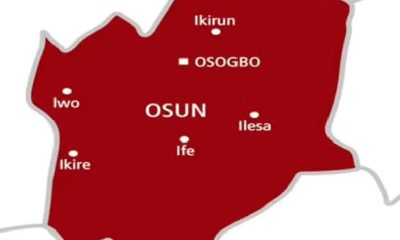
 Opinion5 days ago
Opinion5 days agoThe Clout-chasing Dipo Awojide By Comrade Da’Peace
-

 News4 days ago
News4 days agoRamadan, Lent: Shettima Calls For National Unity And Compassion
-

 Opinion4 days ago
Opinion4 days agoReinventing Osun’s Economy Through Dagbolu Intl. Trade Centre: From Quiet Market Lessons To Regional Trade Revolution By Adeboye Adebayo
-

 News4 days ago
News4 days ago‘Wike Factor’: Another PDP Chairmanship Candidate Steps Down For APC In FCT


